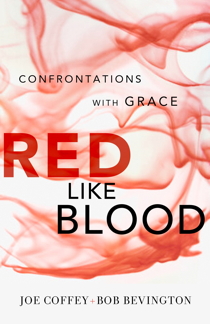
Red Like Blood: Confrontations with Grace by Joe Coffey and
Bob Bevington
Written by a pastor’s kid turned Pastor and an optometrist
with a checkered past, this book, Red Like Blood, confronts the reader with a
message of grace in a fractured world.
Some have commented at some of the crude language of the book, but this
was not the main point nor did the authors constantly return back to
vulgarity. Rather, what you find is a
book bringing hope to the hopeless and life to the dead because of the mighty
grace of God found in Jesus Christ. The
author’s make no bones about it, they have brought upon themselves much pain
and sorrow through sin, but sin is not the final identity marker of their
lives. The personal stories in the book
will lift your spirits and give you a deep encouragement to live for what
matters, honoring Christ in all of our lives.
One story that was particularly powerful was the life of
Phil and Euretta. Bob tells about how
they joined the Sunday night bible study at their house with smiles on their
faces, but with something behind that grin.
Later on, Phil met with Bob and learned that his wife had terminal liver
cancer. Yet, there was an unmistakable
joy in the lives of both Phil and Euretta.
From Euretta, “As soon as we read it (Don’t Waste Your Cancer) the
lights went on. We realized that life is
not our all-surpassing treasure. Christ
is….He’s your treasure too, whether you realize it or note” (96). The sheer confidence of faith in Christ
amidst a terrible disease that would eventually take Euretta’s life was
apparent as she spoke. The love for
Euretta coming from Phil was amazing and a testimony to the Lord’s strength
giving them hope. The message was loud
and clear that although our bodies might wither away from disease and illness,
our faith and our hope are secure. This
kind of faith in the midst of great strain when some people want to curse God
and die is a unique witness to people won over by the gospel.
There is a deep practical theology here in this back. Joe writes, “David was as dirty as dirty can
be. He longed to be made clean. David didn’t need a soft grace. He needed a grace that was like steel wool….The
only thing strong enough to remove the grit in David’s soul or mine flows from
a deeper place. It flows from the veins
of God himself. The blood of God is what
has washed my soul” (133). Joe points
the reader continually to the cross in the book. A kind of grace that can wash sins away and
cleanse us from guilt and condemnation is the kind that was poured out on Golgotha. This kind of forgiving grace goes before a
person and frees them from condemnation.
Bob mentions in the book of his affair with Amy, leaving his wife and
eventually marrying Amy. Later in the
book he makes note that it took a while, but now Amy and Rita are closest of
friends yet had to walk through some rough times where forgiveness was central
to their relationship.
What a wonderful display of God’s amazing grace in the book. At times, the book was kind of messy because
it intertwined life stories of both Bob and Joe with some theological analysis. Yet, I think this kind of writing added
weight to their words because a sound theology is always displayed in an
experiential way through the lives of God’s men and women.
Thanks to Shepherd Press and Cross Focused Reviews for the
review copy of this book in exchange for review.
Comments
Post a Comment